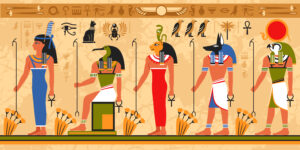“Now when Toi king of Hamath heard that David had defeated all the army of Hadadezer, Toi sent Joram his son to King David to greet him and bless him, because he had fought against Hadadezer and defeated him; for Hadadezer had been at war with Toi. And Joram brought with him articles of silver, of gold and of bronze. King David also dedicated these to the LORD, with the silver and gold that he had dedicated from all the nations which he had subdued” (2 Sam 8:9-11).
Immediately after God’s covenantal promises to David (2 Samuel 7), David initiates a successful military campaign against Israel’s enemies and subdues their lands to the “River” (vv. 1-3). Although this river is not explicitly identified, the repeated allusions to the promises of the Abrahamic Covenant in chapters 6-7 strongly suggest this is “River” is the Euphrates since this is the most distant boundary marker of the land God promised to Abraham (Gen 15:18; see also Gen 2:14). The author, moreover, intentionally chooses the same verb used in the creation mandate (“to subdue/conquer”) to describe David’s “subduing” of the nations (compare 2 Sam 8:11; Gen 1:28). David’s military success is not only a partial fulfillment of the Abrahamic Covenant but also a partial fulfillment of the creation mandate (Gen 1:28). In short, David is typified as the promised seed of Abraham and second Adam ruling over God’s creation (Psa 8:4-8 [5-9]; Dan 7:13-14).
Under King David’s rule, the world was as it was supposed to be for a brief moment. However, David’s “messianic rule” was very short-lived because David was not the Messiah. He was just a man with a very flawed character. And such is the case with every ruler after David. No political leader, no matter how much we may like him or her, can make our broken world great again. There is only one ruler who can fix this terrible mess. Let us not let ourselves become so fixated with the short-lived and ever-changing world of politics and political solutions that we forget to pray, “Thy kingdom come!”
“There shall come forth a shoot from the stump of Jesse, and a branch from his roots shall bear fruit. And the Spirit of the LORD shall rest upon him, the Spirit of wisdom and understanding, the Spirit of counsel and might, the Spirit of knowledge and the fear of the LORD. And his delight shall be in the fear of the LORD. He shall not judge by what his eyes see, or decide disputes by what his ears hear, but with righteousness he shall judge the poor, and decide with equity for the meek of the earth; and he shall strike the earth with the rod of his mouth, and with the breath of his lips he shall kill the wicked. Righteousness shall be the belt of his waist, and faithfulness the belt of his loins” (Isa 11:1-5).










